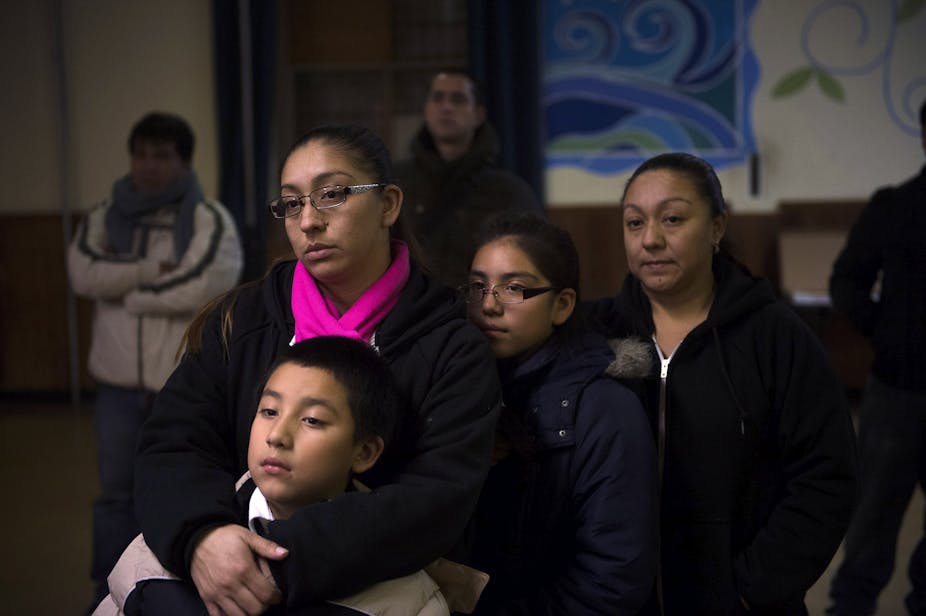Not so long ago, I sat across the table from Teresa, age 25, in a migrant shelter right across the border from Nogales Arizona, her tired face glimmered through the veil of tears as she described her experience two days before our encounter.
Waiting for her husband to arrive from work, a knock had come at the door. There were two officials, one from the school where her children attended. Her husband failed to pick them up. Fearing the worst, she opened the door only to learn with great dismay that he had been picked up at work by immigration officials and taken away, which is why he never showed up at the school.
Now they had come for her. On the night we met at the migrant shelter after having been repatriated by authorities, she was determined to return to find her children.
After settling into a community, Teresa and her husband, who were both undocumented, began their family. Their children are US citizens by birth.
The rise of “mixed status” families
President Obama’s plan for deferred action for certain undocumented immigrant parents promises to bring relief from deportation for people like Teresa. An estimated 5 million undocumented immigrants who are parents or spouses of US citizen or legal permanent residents could benefit.
The Pew Hispanic Center estimates that in 2014, there were 4 million US-born children in the United States with at least one parent who is an undocumented immigrant. This phenomenon – where individuals living under one roof have different immigration status – is ubiquitous and called mixed status families.
Under President Obama’s plan, Teresa and her husband would not face deportation.
However, Republican opposition is currently challenging the president’s authority to give anyone legal status without congressional approval.
But other presidents – notably Republican – used their presidential powers to do the same. In 1987, President Reagan gave protection from deportation to children of immigrants who were given amnesty. In 1989, President George H. Bush enacted a “family fairness” policy that expanded protections for immigrants.
During every election cycle, Republican campaign messages quickly lay claim to family values as inherently home grown. But Teresa’s story embodies national values – courage in the face of the unknown, determination, and commitment to home and hearth.
Deportation and family values don’t go together
Although tragic, Teresa’s is fundamentally a story of family values: a young hard working couple, harvesting berries and potatoes, raising children, faithfully sending money to support elderly parents, and paying off their debts.
The Obama administration has deported a record number of 400,000 immigrants a year, easily surpassing his predecessors. Even proponents of “family values” cannot dismiss the stark contradiction between what we as a nation value, and our immigration laws.
Providing care to the children of deportees strains family budgets and tax public resources, even as undocumented immigrant workers contribute to the public coffers through tax payments to the tune of nearly 9 billion dollars a year, according to the Government Accountability Office. The Social Security Administration’s Inspector General James B. Lockhart III has testified that the growth of this “Earnings Suspense File” is attributed to “unauthorized work by non-citizens.”
To deny the existence of mixed status families and their role in nation-building is to deny the history that has linked us to a global family of nations through immigration, which continues to this day.
In light of congressional failure to pass any comprehensive immigration reform, we should consider the material consequences of not doing anything.
The economic impact of doing nothing
A 2011 Pew study finds that more Latino children were living in poverty in 2010 than children of any other racial or ethnic group, and that more than two-thirds of these (4.1 million) are the children of immigrant parents.
The growing demographic of youths now in the country who are being relegated to poverty, stigmatization, and an uncertain future because one or more of their parents is undocumented and at risk of deportation, should concern all of us.
Our future will depend on an educated and healthy workforce and its contribution to this country’s economic standing and our social security system through income taxes.
As the country braces for a potential partisan showdown, my thoughts returned to the night I met Teresa.
At the shelter, Teresa was apprehensive. With her husband’s whereabouts still unknown, she instinctively prepared herself for the dangers that lay ahead: crossing the border in the dead of night to “el otro lado,” (the other side) risking life and limb, to reconnect with her community in Oregon to find her children. If in her shoes, I might well do the same.

